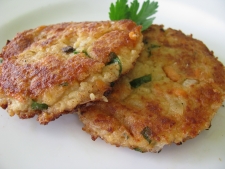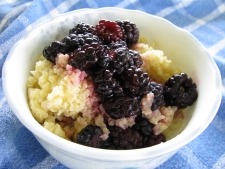The staunchest
no-millet people find themselves warming to this grain. Its colour being
closest to paddy rice could be one big reason, not to mention its simple
flavor.
Measures are based off
a cupe measure of 8 oz. This recipe has been adapted from Peter Reinhart’s
book. The Sama makes the bread moist.
Overnight starter:
Whole Wheat flour – 1 3/4 cup
Yeast (active dry) – 1/3 tsp. Use twice as much if you are using fresh yeast.
Water – 1 cup
Mix all and leave
overnight. You don’t have to knead this mixture at all. The gluten strings will
develop overnight.
Dough:
Overnight Starter – all
WW flour – 1 cup
Salt – 1 tsp
Honey – 1 1/2 tbsp
Cooked sama – 6 tbsp. Mash it up a bit.
Oil or butter – 2 tbsp (optional)
No more water is needed for the dough. You might need some to just wet your
hands while kneading.
The overnight starter
should have bubbled and fallen. Mix all ingredients well. Rest the dough for 5
mins, so it relaxes and helps you knead better. Knead for about 300 strokes or
till you find the dough stretchy and silky. Rest for a min or two. Knead for
another minute. Leave in a bowl for 1-1.5 hr for the first rise. You know this
rise is done when you poke a wet finger gently into the dough. If it makes an
impression that just stays and does not get filled up. its ready for shaping.
If it fills up, then leave it for some more time.
Gently shape the dough
and place in tin/basket and leave for 45min – 1 hr. In the mean time, heat your
oven to 250C.
Slash the top of the dough just before you put it into the oven.
Bake
at 250 for 10 minutes. Then reduce heat to 220 and bake till done.1
Let the bread cool
before you slice it.
2 cups sama (little millet)
1 cup
sprouted mung dal
6 cups
water
carrots,
beans (can add peas also)
1″
ginger chopped small
4-6
cloves
2-3 1″
cinnamon sticks
turmeric
salt
Seasoning:
jeera, 1 onion chopped, oil
Chop
the carrots and beans. Pressure cook the veggies with sama, spouted mung,
ginger pieces, cloves, cinnamon, turmeric, salt and water. Sautejeera and onion
in oil. Add the seasoning to the khichdi. Its ready to eat!
Sama Sprouted MungKhichdi
1 cup korra (foxtail millet) or sama (little millet)
2 cups water
Cook the millet in water just as you would cook rice. Serve with vegetables,
dal etc
Very flavourful, the
grains are larger than Foxtail and Little millet grains. When cooked as rice,
the grains keep their shape and can be used to make lime rice, cocunut rice and
any other such dish where one wants grain integrity to be maintained.
Varagu Rice – 1 cup
Water – 2 cups
1/2 grated coconu
Carrot – 1, chopped and
steamed (optional)
Onion – 1, chopped
Seasoning – Curry
leaves, Channa Dal, Mustard Seeds, Oil
Cook the varagu in
water. Let it cool down completely, so it does not become mushy when you
prepare the coconut rice. Add seasoning to oil. Then saute onions and add the
steamed carrots. Add grated coconut and let it cook for a minute. Then add the
rice and mix everything well. Viola!
Varagu – 1 cup (or 1/2
cup varagu, 1/2 cup paddy rice)
Water – 2 cups
Raw mango, grated – 1
or per taste
Groundnuts – 2 tbsp
Seasoning – curry
leaves, chillies. mustard seeds, urad dal, turmeric, asafoetida, oil
Salt to taste
Cool the varagu in
water and let it cool before mixing the rest of the ingredients. Fry groundnuts
in oil, keep aside. Prepare the seasoning. Add grated mango and saute for a
minute. Add the rice and groundnuts. Tangy mango rice is ready.
Bajra flour, with its
characteristic hints of dark green and brown is used to make delicious, rustic
rotis. It can also be sprouted as it is a naked grain.
Kambu (Pearl Millet) flour – 2 cups
Drumstick leaves
Chopped Onion – 1
Water to make dough
Salt to taste
Oil
Mix the flour, leaves, onion, salt and water to form a stiff
dough. Pat out theadais directly onto the tava with your hand.
These adais are
much thicker than wheat rotis. Let the side on
the tava cook well before you flip it. Cook well on the other side too. Serve
with chutney.
Bajra grains
Soak
the bajra grains overnight. Tie them in a cheese cloth for a day or
as long as you want the sprouts to mature. You can eat them raw or leave them
in boiling water for a minute or two and then eat.
Bajra rice can be made from Bajra rava,
ie, broken Bajra.
Broken Bajra – 1 cup
Water – 2 cups
Pressure cook the broken Bajra just like you
cook paddy rice. It makes a very delicious rice.
Measures are based off a cupe measure of 8 oz. This recipe has
been adapted from Peter Reinhart’s book. The cooked broken bajra makes the
bread moist.
Overnight starter:
Whole Wheat flour – 1 3/4 cup
Yeast (active dry) – 1/3 tsp. Use twice as much if you are using fresh yeast.
Water – 1 cup
Mix all and leave
overnight. You don’t have to knead this mixture at all. The gluten strings will
develop overnight.
Dough:
Overnight Starter – all
WW flour – 1 cup
Salt – 1 tsp
Honey – 1 1/2 tbsp
Cooked bajra -
6 tbsp. Mash it up a bit. Use bajra rava. Cook
one measure in 3 measures of water.
Raisin or date puree –
Soak ½ oz raisins in ½ oz water overnight. Puree before use.
Oil or butter – 2 tbsp
(optional)
No more water is needed
for the dough. You might need some to just wet your hands while kneading.
The overnight starter
should have bubbled and fallen. Mix all ingredients well. Rest the dough for 5
mins, so it relaxes and helps you knead better. Knead for about 300 strokes or
till you find the dough stretchy and silky. Rest for a min or two. Knead for
another minute. Leave in a bowl for 1-1.5 hr for the first rise. You know this
rise is done when you poke a wet finger gently into the dough. If it makes an
impression that just stays and does not get filled up. its ready for shaping.
If it fills up, then leave it for some more time.
Divide the dough into a
dozen pieces and flatten each piece and then roll it up. Leave for 45min – 1
hr. In the mean time, heat your oven to 250C.
Bake at 250 for 10
minutes. Then reduce heat to 220 and bake till done. The rolls bake in 15
minutes. Let them cook for 5 minutes and you can eat them hot.
You could use them as the pav for pavbhaji.
2 cups of bajra floor
2 cups of water
1. Take 2 cups of water
and bring it to boil. The moment the water starts to simmer pour the the 2 cups
of Bajra in the boiling water.
2. Adjust the stove to
“sim” and do not mix the Bajra with the water. Just leave it like that.
Add
Bajra flour to hot water
3. Now After 2 minutes
turn off your gas and get then mix the floor thoroughly. (If you feel you need
to add some more Bajra floor you can add it. But if you want to add more water
then you need add hot water.)
Mixing
the flour and water
4. Now allow the dough
to cool down (10 minutes)
5. Then roll them into
small balls
6. When rolling them
out into circular shapes puff/dust them with try Bajra floor
7. Now place it on the
hot pan.
Bajra
roti getting made
8. Use a cloth to press
it on all sides and then keep changing the sides of the chapati. (You can use
your hand, but cloth is a better option)
9. Optionally you can
also add/spread some oil on the chapti to get the Paratha effect.
MethiMattarBajra Dalia Khichdi (Serves 3 adults)
Wash a bundle of methi
well and remove the roots. You do not have to separate the leaves from the
stalk since the khichdi is going to be pressure cooked.
Wash a handful of peas,
2 tomatoes, ginger (to taste – since it is cold here I used a six inch piece),
green chillies (2 green ones slit lengthwise) and a few cloves of peeled
garlic.
Add a teaspoon of oil
(gingily, olive or mustard oil) in the pressure cooker. Pop a few mustard
seeds. Add the ginger, garlic, coarsely chopped tomatoes and green chillis.
Saute for a minute and then add the methi and one cup of bajradalia. Stir for a
couple of minutes.
Add 2 1/2 cups of
water. Let the mixture boil and close the cooker. After 2 whistles of the
pressure cooker lower the flame and let the khichdi cook on low flame for 7-8
minutes. Turn off the flame and once the pressure is released completely from
the cooker open the lid and enjoy the delicious khichdi with curd / a chutney
of your choice.



